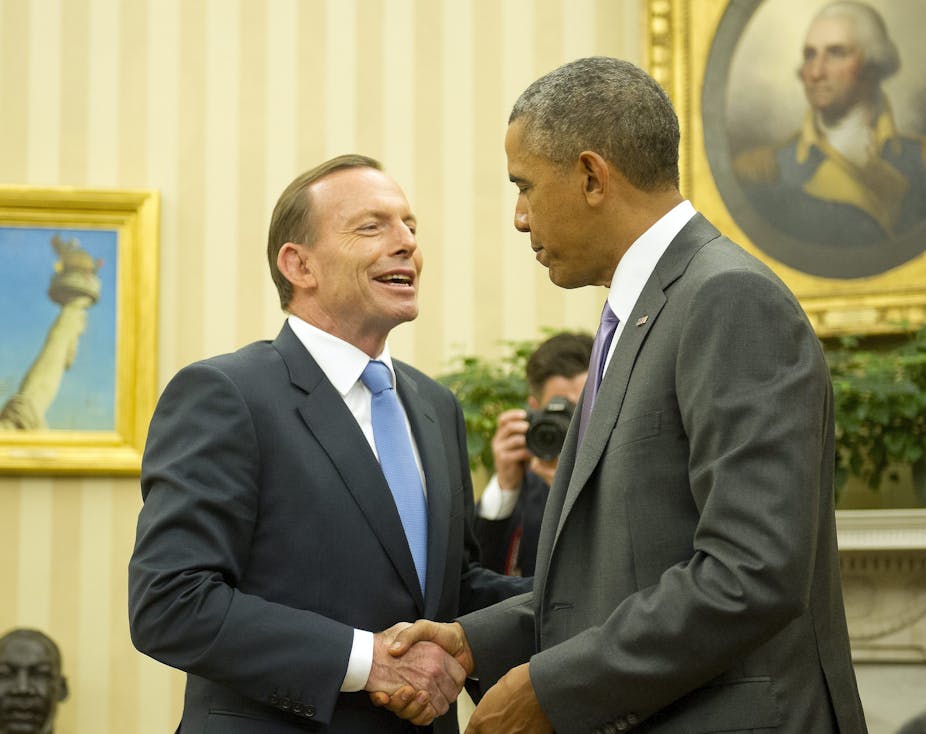Tony Abbott and US president Barack Obama discussed the Ebola crisis in a telephone conversation on Wednesday morning.
But the Prime Minister’s Office declined to say whether there had been any presidential request for aid in kind, or mention of Australia’s difficulty in persuading other countries to guarantee evacuation arrangements.
A statement from the PMO said that Abbott spoke with the President for about half an hour. “They discussed the situation in Iraq, the Ebola epidemic and the upcoming G20 summit in Brisbane.
"The President thanked Australia for its efforts in Iraq and continued commitment to disrupting and degrading ISIL.
"They agreed that the international community needed to act swiftly to arrest the Ebola epidemic and the President thanked the Prime Minister for Australia’s contribution to date. The US and Australia will continue to coordinate closely on both these matters and other national security priorities.
"The Prime Minister said he looked forward to welcoming the President to Brisbane in November for the G20.”
Asked by The Conversation for further detail of what had been canvassed on Ebola and who had initiated the call, a spokeswoman said: “we have nothing further to add to the statement”.
The Australian government, which has provided A$18 million in funding, has said it is not sending medical teams to West Africa because it cannot make evacuation arrangements for anyone infected.
Meanwhile, there have been contradictory signals about Australia’s precise state of readiness if called on to deal with any regional outbreak.
The government’s chief medical officer, Chris Baggoley, appearing at a Senate estimates hearing, said it could take up to two weeks to get Australian Medical Assistance Teams skilled up. They had not been trained in Ebola treatment or the use of the personal protective equipment.
But Martin Bowles, who has recently moved from heading the Immigration department to become secretary of the Health department, said that “to say that we are not ready … is not true”. People trained to deal with any domestic outbreak would be used in the first instance for a regional one. Australia had 20 trained staff and could deploy to the region immediately, he said.
Labor jumped on the Baggoley evidence, saying he had “confirmed the Abbott government has not even called for volunteers or organised training”.
This was in stark contrast to the claims Health Minister Peter Dutton had made that Australia had “the capacity and the capability to … rapidly deploy forces out of Darwin into a near neighbour,” Labor deputy leader Tanya Plibserek and health spokeswoman Catherine King said in a statement.
Dutton accused Labor of trying to “denigrate our national capabilities and our dedicated and highly skilled health workforce”.
“Australia is ready and able to assist our neighbouring countries across our region should this terrible disease appear here,” he said.
The Obama-Abbott discussion of Iraq came as Australia continues work on the implementation of the arrangement, which Foreign Minister Julie Bishop bedded down in Baghdad several days ago, to get special forces into the country. This appears likely to take until next week.
At Senate estimates, Defence Minister David Johnston admitted he did not know how Tony Abbott has reached his figure of about $250 million for the cost of every six months of Australia’s deployment to Iraq.
Johnston said he was not sure of the basis of the Prime Minister’s figure, but he was sure he had a proper basis for it.
“He’s made an estimate. He’s obviously either had a discussion with someone inside Defence [or] he has had information that he has obtained himself. I don’t know what that information is,” Johnston said.
As politicians condemned an Islamic State propaganda video featuring an Australian teenager fighting with ISIL, the government sought to clear the way to secure passage of its foreign fighters anti terrorism bill next week by accepting all the recommendations of the parliamentary inquiry into the legislation.
The 37 recommendations – not all of which require changes to the wording of the bill – had bipartisan support on the intelligence and security committee. The opposition flagged last week it would support the bill if they were accepted.
The changes include shorter sunset periods; dropping a provision enabling a whole country to be declared off limits for travel without a valid excuse; clarifying what it means to encourage, advocate or promote the doing of a terrorist act; and removing the opportunity to collect additional biometric data such as fingerprints and iris scans by regulation.
On Wednesday night the Opposition said it did not believe the response represented full acceptance; it is waiting for the wording of the amendments.
Some in the Labor party believe it is not being tough enough with the government on the security issues generally. Despite this, and the nitpicking over the response, the bill seems set to pass next week.

